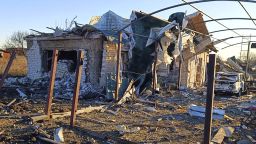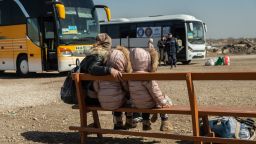Editor’s Note: Cristian Gherasim is an analyst, consultant and journalist focusing on Eastern and Central European affairs. Follow him on Twitter @Crstn_Gherasim. The views expressed in this commentary are his own. View more opinion at CNN.
Bucharest – At least every other week, Ana Golea takes the 620-mile round-trip journey back to her home city of Chisinau – the capital of Moldova – to visit her parents. Fearful for their well-being, the 34-year-old marketing specialist has been doing this ever since Russia launched its full-scale invasion of Ukraine. At that point Moldova, which borders Ukraine and Romania, was quickly thought by some to be Russian President Vladimir Putin’s next target.

The trips she makes from the Romanian capital of Bucharest, where Ana has been living for the past decade, to Moldova, have only gotten more frequent since power blackouts and energy shortages hit the small country of 2.6 million people.
As Russia’s war on Ukraine approaches its one-year mark, Ana not only worries about her parents as they face winter, but also feels anxious over where the next errant missile from the neighboring battlefield might fall.
Last month, Moldovan President Maia Sandu said border police had found missile debris near the village of Larga in Moldova’s north. It was not the first such incident – Moldovan police also found missile debris in December – and it left many to wonder what will happen if the next time luck runs out and a stray rocket hits closer to home.
“Moldova has never been in this situation before,” Ana told me. “A never-ending string of hardships hit this country in a manner no one could predict: a war next door, the energy shortage and now rockets falling near our homes.”
The country has reason to be anxious: Last month, the head of its Security Service warned there is a “very high” risk that Russia will launch a new offensive in Moldova’s east in 2023. Last Friday, a Russian cruise missile crossed over Moldovan territory, the country’s defense ministry said and Ukraine’s military confirmed. (Ukraine’s top general said another missile crossed over Romania.) Soon after, Moldova’s government resigned, its outgoing Prime Minister citing multiple crises brought by Russian pressure. On Monday, Moldovan President Maia Sandu warned of a Russian plot to destabilize her country. (Last year, Russia denied having designs on Moldova, following a series of attacks in Moldova’s pro-Russian separatist region of Transnistria.)
Given wider concern in Europe that Putin’s war could spill beyond Ukraine, countries besides Moldova have reason to worry, too.
Moldova sits to Ukraine’s south, relatively close to Russia’s front lines along Ukraine’s southern, Black Sea coast. Importantly, it separates southern Ukraine from NATO and EU-member Romania, to the west.
Last year, as Russian forces advanced westward toward the Ukrainian port city of Odesa – just 35 miles from Moldova’s eastern tip – Moldovan experts sounded the alarm. Capturing Odesa would give Putin’s army a land corridor from Russia-occupied Ukraine to Moldova, in particular to a pro-Russian separatist region in the Moldova’s east. Fortunately Odesa was spared and the Russian advance is now bogged down in Eastern Ukraine. But the question is, for how long?
In the small country of Moldova, concerns about Putin’s ambition center on an even smaller strip of territory. As Ukraine was after Russia’s incursion in 2014, Moldova has been stuck in a “frozen” conflict since the 1990s, with pro-Russia separatists governing the breakaway eastern-Moldovan region of Transnistria.
Seizing Odesa could have allowed Russia’s army to connect with that territory where some 1,500 Russian troops are stationed—turning the tiny sliver of land into a new Donbas, this time much closer to the doorstep of NATO and the EU.
Now, there is fear that Russia could launch a new effort to reach Moldova, and there’s reason to worry about other countries being dragged into the war, if Moscow does. NATO Secretary General Jens Stoltenberg has warned that Russia is trying to “freeze” the war before a spring assault, which many fear might bring Russian forces once again near Odesa.
Besides the obvious reason of not wanting to let any independent state fall prey to Russia, thereby setting a precedent, Moldova carries a significant strategic importance. It acts like a buffer zone between NATO and Russia. Any invasion of Moldova – with its western leading government, pro-European aspirations and recently gained EU-candidate status – could bring Putin into direct collision with NATO.
Making that a bit clearer, during the NATO foreign ministers meeting in Bucharest in November last year, officials of member countries offered assurances of support to Moldova without saying what that would mean, exactly, the Associated Press reported. NATO members reportedly offered to help with security and defense training in the face of Russian pressure.
For this scenario not to happen, Moldova needs outside help and constant military support to keep it from being perceived by Russia as an easy target. The country, one of the poorest in Europe, has almost entirely outdated military equipment according to Moldova’s defense minister.
Europe has another reason to care: Without Moldova, Europe would have a bigger refugee problem. Since Russia’s full-scale invasion of Ukraine last February, more than 765,000 people have crossed from Ukraine into Moldova, and the small country is hosting more than 108,000 recorded refugees, according to the UN.
During a visit to Chisinau earlier this spring, UN Secretary General António Guterres talked about the fragile position Moldova is in, noting that “Moldova is by far the country that has received the most refugees, as proportion of its own population.” He mentioned that the country finds itself on the “front line of preservation, peace and stability in the world.” But what does that mean, exactly?
Firstly, Moldova took substantial pressure off Europe’s shoulders in dealing with refugees. Out of more than 8 million Ukrainian refugees spread out throughout Europe and beyond, 108,000 may not seem like much, but the burden is substantial for a small country, and it alleviates pressure on others in the region.
Secondly, since Ukrainian refugees have been largely allowed to move freely in Europe, those who did choose to stay in Moldova are usually those having a harder time integrating anywhere else. Moldova’s culture does share a lot of similarities with Ukraine. If Moldova refused or was unable to take in so many refugees, the rest of Europe would have to integrate them.
It goes without saying that for one of the poorest countries in Europe, sheltering so many refugees likely won’t be sustainable for a long period of time without assistance. Russia, meanwhile, may hope Moldova will crack under this influx of refugees, this helping to further destabilize Eastern Europe.
Moldova’s woes have to do with internal factors as well. The country’s corruption and oligarchic system are decades-long issues that the current pro-EU government has struggled to curb. Moldova’s judicial shortcomings have been also highlighted in a recent Council of Europe report, with its judiciary system coming again under scrutiny following a disputed contest for the top job of chief prosecutor.
Moldova is also losing its people. According to World Bank statistics, Moldova has lost more than 12% of its population since 1991, as it has been hit hard by the demographic decline seen throughout many parts of post-communist Europe.
All pales in comparison with Moldova’s current energy problem. The country’s dependency on both Russia and Ukraine for energy puts it in probably the most difficult spot it has ever been in since declaring independence from the Soviet Union in August 1991.
Gazprom has slashed its gas exports to Moldova and Ukraine has halted energy exports altogether due to Russian missile attacks. In November, Russian attacks on Ukraine caused power blackouts in half of Moldova. As a result of all this, Moldova is left with only the 10% of electricity that it manages to produce by itself.
There’s a light at the end of the tunnel, in that EU member states, especially neighboring Romania, agreed to provide as much as 90% of Moldova’s energy needs. Another sign of hope is that Moldova has proven very astute at fighting propaganda, helping thus lessen the sway Russian backed politicians and businessmen have on its institutions. In December, Moldova suspended six television channels airing Russian misinformation. More importantly, Moldova is fighting propaganda through an overhaul of its cyber defense system with assistance from the EU.
Though Moldova is unlikely to become part of the EU anytime soon, the country’s European-leaning objectives and desire to tear itself away from Russian influence have brought security guarantees and Western aid like never before.
Moldovan President Maia Sandu, plain spoken and charismatic, is leading a charm offensive; Sandu has met with Western leaders and gave an inspiring commencement speech at Harvard, helping to bring attention to Moldova’s plight. She knows that there would be nothing worse for Moldova than to be forgotten and ignored on the world stage.
In that way, as in many others, Moldova offers a parallel to Ukraine’s position, in miniature. But in every crisis there is opportunity. Moldova can emerge a stronger player in world affairs. It has the strategic position and the regional know-how to do that. But three things need to happen: International support, both militarily and economic, is crucial; Moldova needs to fight extreme poverty and corruption as the pro-EU government said it will do, and the world needs to pay more attention. Not doing so, ignoring an important piece of the puzzle in Eastern Europe, would bring us closer to all-out war.
Ana Golea hopes that things will improve, that her parents will be safe, that her country can avoid being dragged into conflict, but she acknowledges that for that to happen, Moldova desperately needs outside help and assistance to face this flurry of challenges.




